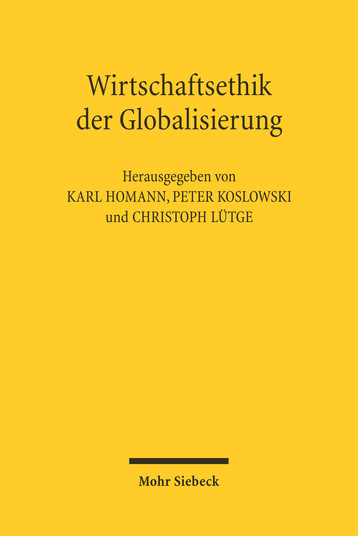Economics
Wirtschaftsethik der Globalisierung
Hrsg. v. Karl Homann, Peter Koslowski u. Christoph Lütge
[The Ethics of Globalization.]
2005. VII, 402 pages.
109,00 €
including VAT
including VAT
sewn paper
ISBN 978-3-16-148503-9
available
Published in German.
We are confronted daily with the problems of globalization. Many people regard globalization as a threat not only to their economic existence but also to the way they see themselves culturally and morally. For these reasons many of them join ATTAC or other organizations, and their protests have been known to escalate at international conferences.Underlying these protests are often intuitive attitudes towards globalization. The authors of the articles in this volume have organized these attitudes into distinct dimensions of the problem, so that these can be dealt with separately and, if possible, re-integrated into an overall picture.
It is an undisputed fact that globalization has normative, cultural dimensions. But these problems are often discussed apart from the economic dimensions, or in direct contrast to them. The editors hope that this volume can help overcome this unproductive division of the discussion into normative questions and economic considerations.
Survey of contents
Einleitung der Herausgeber – Karl Homann: Globalisierung aus wirtschaftsethischer Sicht – Michael Ehret, Michaela Haase, Martin Kaluza: Konzepte der Globalisierung: von Bretton Woods über Washington und Cancún zu gerechterer Globalisierung? – Manfred Prisching: Die Globalisierung von zeitdiagnostischen Wirtschafts- und Gesellschaftsmodellen – Christoph Lütge: Auf welche normativen Ressourcen kann sich die Demokratie in der globalisierten Welt noch stützen? – Klaus J. Hopt: Globalisierung der Corporate Governance – Frits Schipper: Transparenz und Integrität: Gegensätzliche Begriffe? – Rüdiger Waldkirch: Steht der Shareholder Value auf einem sicheren Fundament? – Eberhard Schnebel und Margo A. Bienert: Zur ökonomischen Rolle von Werten in internationalen Unternehmen – Alexander Brink: Management und Anerkennung – Bernhard Hirsch und Matthias Meyer: Kooperationscontrolling auf der Basis von Vertrauenstreibern – Ingo Pies und Markus Sardison: Ethik der Globalisierung: Global Governance erfordert einen Paradigmawechsel vom Machtkampf zum Lernprozess – Bernd Adam: Global Governance, NGOs, multinationale Unternehmen und der Global Compact – Bemerkungen aus Sicht der Diskursethik – Michael Neuner: »Deutungsimperialismus« und kulturelle Globalisierung: Eine medienethische Betrachtung – Christoph Hubig: Globalisierung der Technik und ihre wirtschaftsethische Bedeutung – Matthias Maring: Die Produktionsbedingungen in der internationalisierten Automobilindustrie – Helmut F. Spinner: Ist die Wissensgesellschaft globalisierbar? – Klaus Wiegerling: Globale Objektivierung in informierter Handlungsumgebung – Niels Gottschalk-Mazouz: Was heißt »Globalisierung des Wissens« und welche ethischen Aspekte lassen sich erkennen? – Elke Mack: Globale Gerechtigkeitskriterien zur Beurteilung der Entwicklungsrelevanz von Globalisierungsprozessen – Jesús Conill: Ethische Grundlagen des Ansatzes der Fähigkeiten von Amartya Sen – Bernhard Emunds: Gerechte Nord-Süd-Beziehungen über internationale Finanzmärkte – Wolfgang Buschlinger: Der Generationenvertrag als Standortnachteil: Eine Generation wird sich rächen – Georg Marckmann und Matthis Synofzik: Der Zugang zu unentbehrlichen Arzneimitteln als Problem der globalen Gerechtigkeit – Peter Koslowski: Wirtschaftsethik in globalisierten Finanzmärkten.
